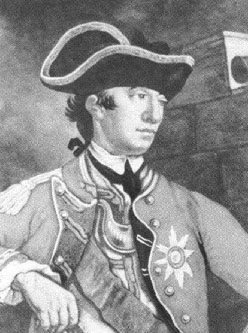William Howe fought many battels, he served under James Wolfe at Quebec, and succeeded Thomas Gage as commander in chief in America. Working with his brother Richad Howe, he succefull assults in Long Island, White Plains, and Forts Washington and Lee. Even in victory, he was subject of criticism. Because he failed to intercept the amercan troops moving across the east river from Long Island to Manhattan in August 1776, and is regarded by many as the missed opportunity to early end the war.
In 1777 Howe defeated Washington at Brandywine and escaped a trap at German Town before movig into Philadelphia for winter.
Howe was hardly criticized for enjoying the pleasures of Philadelphia, rather than keeping on with te hostilities.
Howe was not an incompetent military leader, but just he preffered to fight with the old european approach. War in his view was an enterprise conducted by gentelmen who should not be expected to bestir themselves during inclement weather.
Howe decision to move to philadelphia, rather than to join general Burgoyne in 1777, is considered to be the decesive decision of the war. And he was removed from his command in 1778, in favor of Sir Henry Clinton.
viernes, 18 de marzo de 2011
Baron von Steuben
You say to your soldier, 'Do this' and he does it. But I am obliged to say to the American, 'This is why you ought to do this' and then he does it
Baron von Steuben
Von Steuben was born in Magdeburg, Germany. He attended Jesuit schools in Breslau, entered the Prussian army's officer corps, and served in the Seven Years War. He then joined Frederick the Great's military staff. Later, he was appointed chamberlain to the Prussian court of Hohenzollern Hechingen. In 1777, Von Steuben went to Paris to meet America's foreign commissioners, Benjamin Franklin and Silas Deane, and offer them his military services. The Continental Congress, much impressed by Von Steuben's title and his refusal to accept any salary while in service, immediately sent him to George Washington at Valley Forge.
Although he spoke no English, Von Steuben systematically trained the amateur American troops in military discipline and battle-readiness. This rigorous training saved the troops from complete defeat during the Battle of Monmouth. In 1779, Von Steuben prepared his Regulations for the Order and Discipline of the Troops of the United States, which remained America's official military manual for over three decades.Later in the war, Von Steuben commanded the Army supply center in Virginia and fought at Yorktown. Afterward, Washington employed him in a variety of duties from the creation of a plan to demobilize the wartime army to the acceptance of Britain's surrendered Canadian forts. Von Steuben helped to found the Society of the Cincinnati, and then resigned his American commission in 1784. After the war, the New York legislature granted Von Steuben an estate. He received a small pension from the United States government, but relied on friends like Alexander Hamilton to settle his mounting debts. Von Steuben died on November 28, 1794
lunes, 14 de marzo de 2011
The Hessians
The Hessian Flag
The Hessians were German soldiers, who fought for King George III in various wars. They participated in the Seven Year War and in the American Revolutionary War. Although they are commonly thought as mercenaries, they were far from being so. The Hessians were not paid for paying, actually, they almost didnt receive much wage besides their daily bread, but it was the Hessian Prince that benefitted from this by sellling their services.The German soldiers hired were almost 30,000 but since 12000 of those came from Hesse-Cassel, the name remained Hessians
viernes, 11 de marzo de 2011
The Brown Bess
Though firearms have become the predominant weapon in the battle field on the 18th century, there was little standardization in their design and manufacture, so supplying their ammunition and getting repair parts become a problem. So in an attempt to solve the problem, they introduced the Land Pattern Musket, that within fifty years gain the nickname of the Brown Bess. It is said the name may be derived by the german term of strong gun (braun buss). the weapon became as long as 62 inches, and with a weight of 11 pounds, and as short as 42 inches, with a weight of 10 pounds.

The Brown Bess was used by some until the end of the Napoleonic Wars, and was used by both sides in the American Revolution.

The Brown Bess was used by some until the end of the Napoleonic Wars, and was used by both sides in the American Revolution.
Suscribirse a:
Comentarios (Atom)



